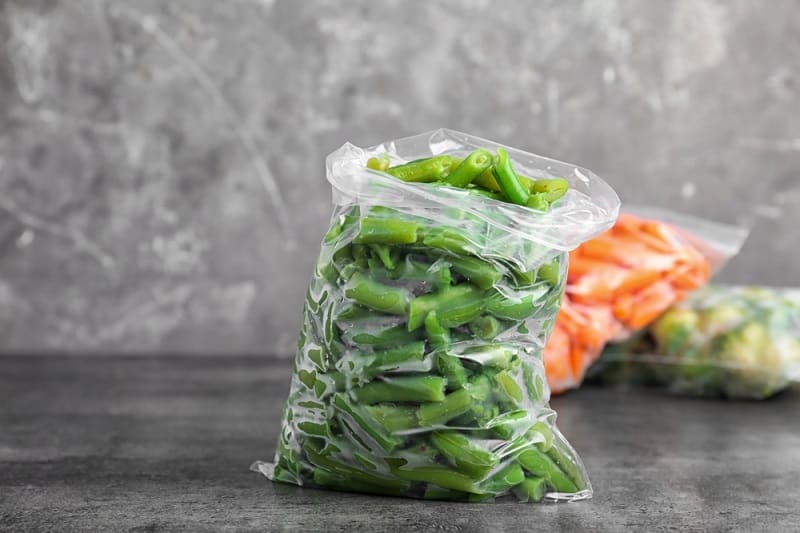Have you ever wondered why your perfectly cooked green beans end up slimy and unpleasantly mushy? It can be frustrating when you put time and effort into preparing a vegetable side dish, only to have it turn out less than appetizing. In this article, we will explore the reasons behind this slimy phenomenon and provide you with some tips to help you achieve perfectly cooked green beans every time. So, if you’re tired of encountering slimy green beans on your plate, keep reading to find out what might be causing it and how to prevent it.

Potential Causes of Slimy Green Beans
Overcooking
One of the most common causes of slimy green beans is overcooking. When green beans are cooked for too long, they become mushy and can release a slimy substance. This sliminess is due to the breakdown of the beans’ cell walls, releasing pectin, a natural thickening agent. To avoid this, it is important to cook green beans until they are tender but still retain their crisp texture.
Storing for Too Long
Another potential cause of slimy green beans is storing them for too long. Green beans are perishable vegetables and can spoil if not stored properly. When green beans begin to spoil, they can develop a slimy texture. To prevent this, it is important to store green beans in a cool and dry place, such as the refrigerator. Additionally, it is recommended to consume green beans within a few days of purchase to ensure their freshness and avoid sliminess.
Inadequate Washing
Inadequate washing of green beans can also lead to sliminess. Green beans can accumulate natural substances, dirt, or pesticides during cultivation and transportation. If these substances are not properly washed off before cooking, they can contribute to the development of a slimy texture. To ensure clean and non-slimy green beans, it is crucial to thoroughly wash them under running water, gently rubbing the surface to remove any residue.
High Humidity
Humidity plays a significant role in the texture of green beans. Exposing green beans to high humidity levels can cause them to become slimy. High humidity can create a favorable environment for the growth of bacteria and mold, which can contribute to the sliminess of the beans. To prevent this, it is important to store green beans in a dry environment or use moisture-absorbing methods, such as placing them in a paper towel or a perforated bag.
Bacterial Contamination
Bacterial contamination can also be a potential cause of slimy green beans. If green beans come into contact with harmful bacteria, such as Salmonella or E. coli, they can develop a slimy texture as a result of the bacterial growth. To minimize the risk of bacterial contamination, it is crucial to handle green beans properly, wash hands thoroughly before and after handling them, and ensure that they are cooked at an appropriate temperature to kill any potential bacteria.

Preventing Green Beans from Becoming Slimy
Proper Washing Techniques
To prevent green beans from becoming slimy, proper washing techniques are essential. Start by rinsing them under cool, running water to remove any dirt or residue. Gently rub the surface of the beans to ensure thorough cleaning. If desired, you can also soak the green beans in water mixed with a tablespoon of vinegar for a few minutes to further eliminate bacteria and pesticides. Finally, rinse the beans once again before cooking.
Cooking Methods
Choosing the right cooking method can make a significant difference in the texture of green beans. To avoid sliminess, it is recommended to cook green beans using methods that preserve their natural crunch. Steaming or sautéing green beans for a shorter period of time can help retain their crispness. If boiling green beans, it is important to monitor the cooking time carefully to prevent overcooking and subsequent sliminess.
Storage Guidelines
Proper storage is crucial for preventing green beans from becoming slimy. After purchasing or harvesting green beans, it is important to store them in a cool and dry place, such as the refrigerator. It is best to keep them in a perforated bag or a loosely sealed container to allow air circulation and avoid moisture buildup. Additionally, it is recommended to consume green beans within a few days of purchase to ensure their freshness and prevent sliminess.
Humidity Control
Controlling humidity levels is another key factor in preventing slimy green beans. As mentioned earlier, high humidity can create a favorable environment for bacterial growth and contribute to the sliminess of green beans. To maintain optimal humidity levels, store green beans in a dry environment. Additionally, you can place a moisture-absorbing substance, such as a paper towel or a sachet of silica gel, in the storage container to absorb excess moisture and prolong the freshness of the beans.
Hygienic Practices
Ensuring hygienic practices can minimize the risk of bacterial contamination and subsequently reduce the chances of green beans becoming slimy. It is important to wash hands thoroughly before and after handling green beans to prevent the transfer of bacteria. Also, be sure to clean all utensils, cutting boards, and countertops that come into contact with the beans. By following proper hygiene protocols, you can help maintain the quality and texture of green beans.

Benefits of Eating Green Beans
Nutritional Value
Green beans are not only delicious but also packed with essential nutrients. They are low in calories and fat, making them an excellent choice for those who are watching their weight. Green beans are a good source of fiber, vitamins A, C, and K, and minerals such as manganese and potassium. Incorporating green beans into your diet can provide you with these essential nutrients, contributing to overall health and well-being.
Digestive Health
The high fiber content in green beans promotes good digestive health. Fiber adds bulk to the stool, helping to prevent constipation and promoting regular bowel movements. Including green beans in your diet can support a healthy digestive system and aid in the proper functioning of the gastrointestinal tract.
Heart Health
Green beans can be beneficial for heart health due to their high content of antioxidants and potassium. Antioxidants protect the cells from oxidative damage, reducing the risk of cardiovascular diseases. Potassium helps regulate blood pressure and maintain a healthy heart rhythm. By incorporating green beans into your meals, you can contribute to a heart-healthy diet.
Blood Sugar Control
Green beans have a low glycemic index, which means they have a minimal impact on blood sugar levels. The fiber in green beans slows down the digestion and absorption of carbohydrates, leading to a gradual rise in blood sugar levels. This can be especially beneficial for individuals with diabetes or those trying to manage their blood sugar levels.
Weight Management
With their low calorie and high fiber content, green beans can be an excellent addition to a weight management plan. The fiber in green beans helps promote satiety, making you feel fuller for longer periods of time. This can help reduce overall calorie intake and support weight loss or weight maintenance efforts.

Conclusion
Understanding the potential causes of slimy green beans and implementing preventive measures can help maintain their quality and texture. Overcooking, inadequate washing, improper storage, high humidity, and bacterial contamination are common factors that can lead to sliminess. By following proper washing techniques, choosing appropriate cooking methods, storing green beans correctly, controlling humidity levels, and practicing good hygiene, you can prevent green beans from becoming slimy.
Additionally, incorporating green beans into your diet offers numerous health benefits. Green beans are packed with essential nutrients, promote digestive health, support heart health, aid in blood sugar control, and can be beneficial for weight management. By enjoying green beans regularly, you can nourish your body and enjoy their delicious and nutritious qualities. So next time you cook green beans, remember to wash them thoroughly, cook them just right, and savor their many benefits.




